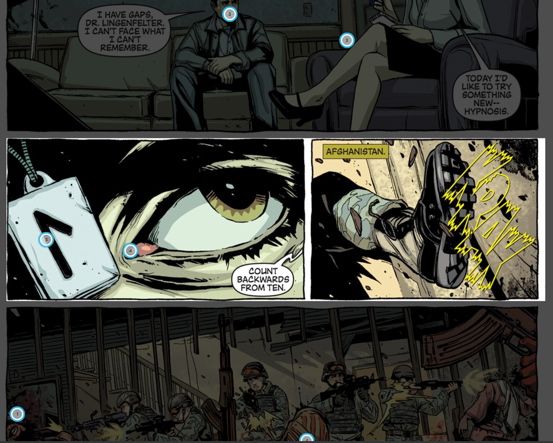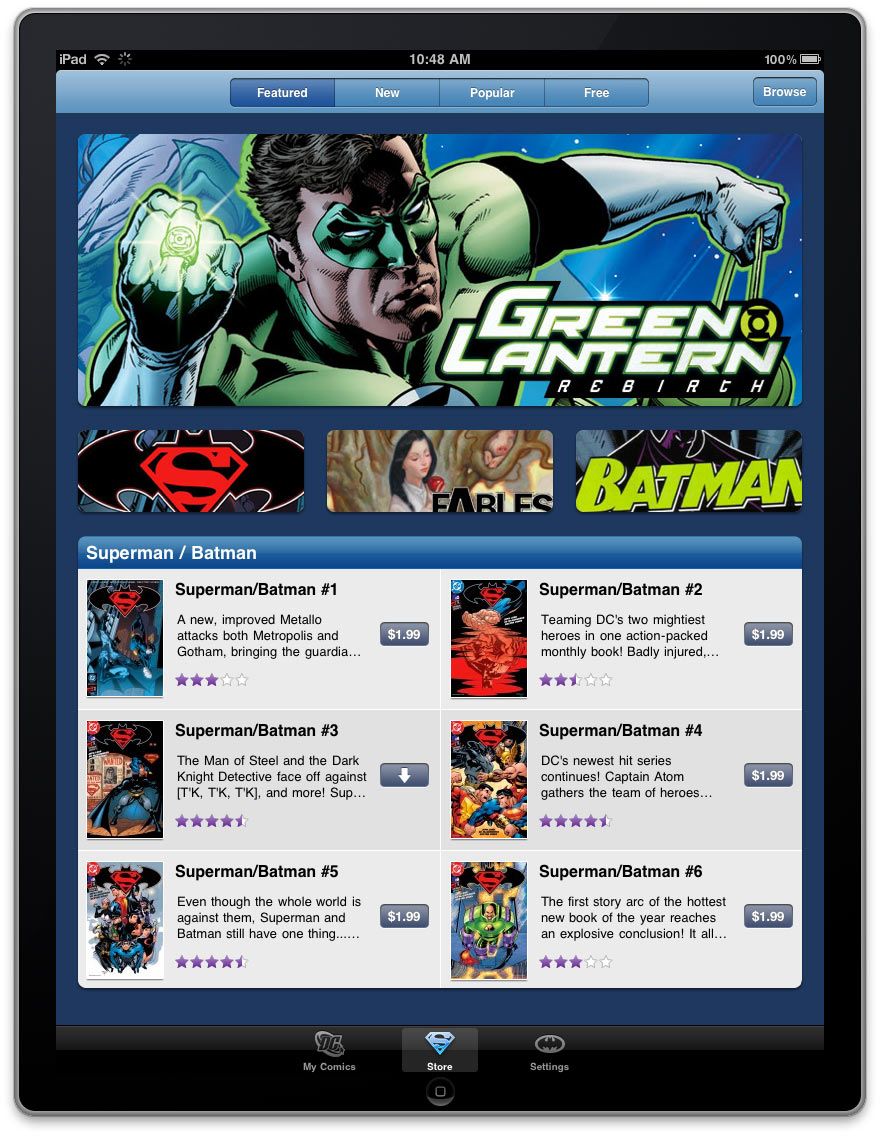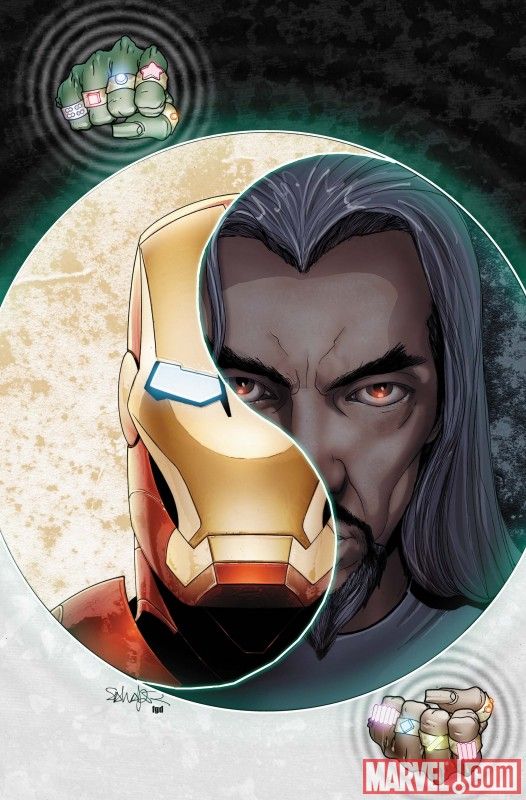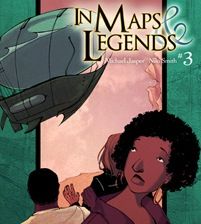What a difference a year makes! A year ago today, the iPad not only didn't exist, it hadn't been officially announced yet. People read comics on their iPhones and iPod Touches, but the screens were too small for a good experience (and therefore, no one wanted to spend much money on them). The iPad changed all that, with a big, full-color screen that is just a tad smaller than a standard comics page (and a tad larger than a standard manga page), and publishers started taking digital comics seriously. The distribution was already in place, thanks to the iPhone—comiXology, iVerse, Panelfly—and now the publishers not only jumped on board with those platforms but also started developing their own apps.
The digital comics scene is still developing, but the iPad was the game changer. For many people, it was the first time that they could comfortably read comics on a handheld screen. Now, it's just a question of marketing—this year, publishers will grapple with bringing comics to a wider audience, outside the existing readership, and balancing the digital marketplace with the established brick-and-mortar retail structure.
Here, then, is a look back at our digital year.
January
Apple announces the iPad.
February
Graphic.ly, which at this point still hasn't released their product to the public, acquires iFanboy.
Forbes.com reports that Apple's iBookstore would have "Comics and Graphic Novels" as a top-tier category. Plans must have changed, as the current version, sadly, features no such category.
March
Jason Thompson explores iPhone apps that pick up manga from illegal scan sites. At the end of the year, many of these apps are still going, but with less content than before.
Rantz Hoseley tells Heidi MacDonald that Longbox, billed as "iTunes for comics," would launch its public beta at Emerald City Comicon.
Tokyopop CEO Stu Levy tells ICv2 that Tokyopop would publish its own iPhone content this year and that he is very excited about the iPad, especially the iBookstore. At the end of the year, only one new Tokyopop book (Hetalia: Axis Powers) is available digitally, and Tokyopop is completely absent from the iBookstore.
iVerse, one of the pioneers of iOS comics apps, announces it will have a comics app ready to go the day the iPad launches.
April
With the launch of the iPad just days away, Marvel announces that it will have its own app, developed by comiXology.
Comic apps on the iPad at its launch include Comics by comiXology and Comics+ by iVerse.
IDW announces four iPad apps, mirroring its iPhone apps: an IDW app and branded apps for G.I. Joe, Transformers, and Star Trek. (IDW's apps were developed by iVerse.)
The Japanese publisher Animate begins publishing yaoi manga directly to the Kindle, in both English and Japanese.
Apple rejects a proposed iPhone app from Pulitzer Prize-winning political cartoonist Mark Fiore because it "ridicules public figures"—which is pretty much what political cartooning is all about. A few days later, Apple reverses that decision.
ICv2 estimates North American digital comics sales at between half a million and a million dollars annually.
I note that all the manga apps in the iTunes store take content from illegal scan sites.
May
Masaaki Hagino, of the Japanese e-book developer Voyager Japan, says that the iTunes store rejected 30% of the Kodansha manga his company adapted for the iPhone due to relatively mild violence and nudity
IDW announces it is creating comics apps for the BlackBerry; it is the first publisher to do so.
June
Marvel announces its first comic to be released in print and digital form on the same day: Invincible Iron Man Annual. The total cost of the digital version, which was released as three separate issues, was a dollar more than the print comic. Six months after this was big news, the price of the digital version has not dropped.
Longbox launches its public beta.
Apparently unaware of the irony, Apple forces the creators of Ulysses: Seen, a graphic-novel adaptation of James Joyce's Ulysses, to re-frame a number of panels to eliminate some nudity. A few days later, they reverse their decision.
Boom! Studios unveils its iPhone/iPad app and announces that it will make its entire backlist available digitally through comiXology, iVerse, Graphic.ly, and Panelfly.
DC announces its iPad app, developed by comiXology, and reveals that it will pay royalties to creators for digital downloads of their work. Joe Quesada hastens to clarify that Marvel is also paying digital royalties to its creators.
July
Fraud arrives in the digital paradise, as a rogue developer hacks into people's accounts and uses them to buy his comics apps (poorly translated bootleg manga) and boost their ratings in the iTunes store.
Graphic.ly launches a Windows 7 version, making digital comics more accessible to non-Apple users.
As things get crowded in the digital ecosystem, webcomics entrepreneur Joey Manley says the big publishers are getting it right, for once.
August
Just in time for summer vacation: The Scott Pilgrim iPad app (developed by comiXology).
Image Comics joins the growing number of publishers who have their own iPad app.
Webcomics creators rise up in arms against a mobile app that is basically an RSS feed pre-loaded with comics—but that accessed their sites without their consent, and which they fear would steal readers.
September
Chip Mosher of Boom! Studios says that making their backlist available digitally has grown their audience rather than cannibalizing print sales.
Comics come to the digital library service Overdrive.
Marvel comics become available on the Graphic.ly platform.
The Walking Dead goes day-and-date in the comiXology app with a cover price of $2.99 (higher than the previous delayed issues but the same as the print comic).
October
At New York Comic-Con, Dark Horse announces its digital initiative (a stand-alone app that will debut this month) and Boom! Studios reveals that its titles will be available on MyDigitalComics.com. Yen Press becomes the first manga publisher to announce its own app, which is also a stand-alone app (and which has not yet launched).
ComiXology launches a Walking Dead comics app.
Barnes & Noble unveils a color version of their Nook e-reader.
November
The manga publisher Viz announces its iPad app.
Due to a glitch in the system, comiXology releases Ultimate Thor #2, which Marvel is publishing simultaneously in digital and in print, a week early. Benjamin Simpson buys it, reads it, and wakes up the next morning to find that Marvel has locked the comic on his device, making it unreadable until the official release date. This raises the question of whether digital comics readers are buying the comics or just a license to read them, a question later explored in depth by David Brothers.
ComiXology announces it will make their developer tools available to a select group of publishers to help speed up the process of getting their comics onto the platform.
December
Apple posts its lists of top apps of the year, and comics do very well: ComiXology's Comics app and the Marvel and DC apps (both developed by comiXology) are among the top-grossing apps.
Digital Manga Publishing makes its Vampire Hunter D manga available on the Nook.
ComiXology launches a version of its app for Android devices.
IDW begins releasing graphic novels as stand-alone apps.
Someone figures out how to put bootleg manga on the Kindle.
Marvel announces that the Death of Spider-Man arc in its Ultimates line will be released simultaneously in print and digital.
Dark Horse announces the initial lineup for its comics app, which will launch with full story arcs of Hellboy, Conan, The Guild, Umbrella Academy, and other comics, both bundled and as single issues.
Finally, just as Time Magazine has its Person of the Year, I think it's appropriate to designate a Digital Creator of the Year. It's a tie, actually, between Alex De Campi, creator of Valentine, and Mike Jasper and Niki Smith, the co-creators of In Maps and Legends. Alex, Mike, and Niki published their comics on every imaginable platform this year—iPhone, iPad, Android, Kindle, Nook—and that sort of versatility is what creators will need to have in the coming year, as digital comics expand and develop in, hopefully, a variety of niches.





